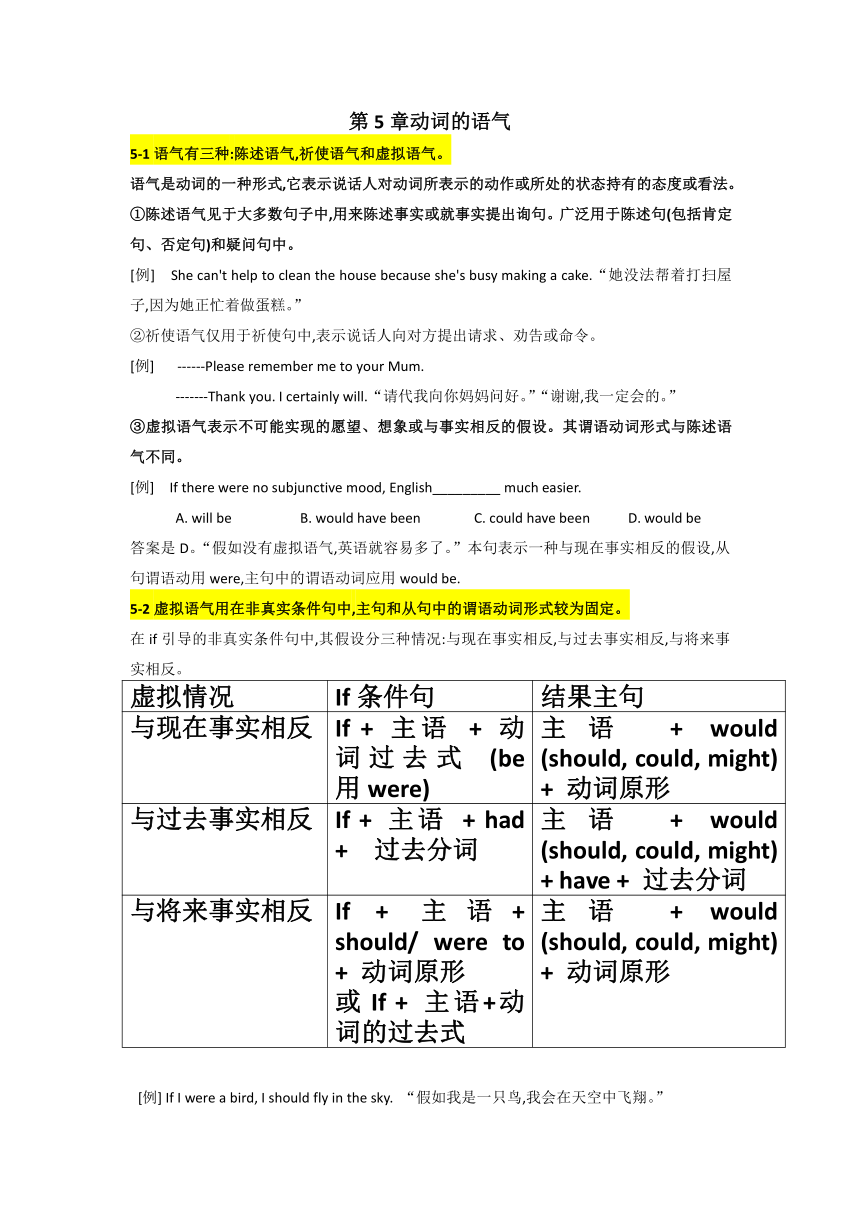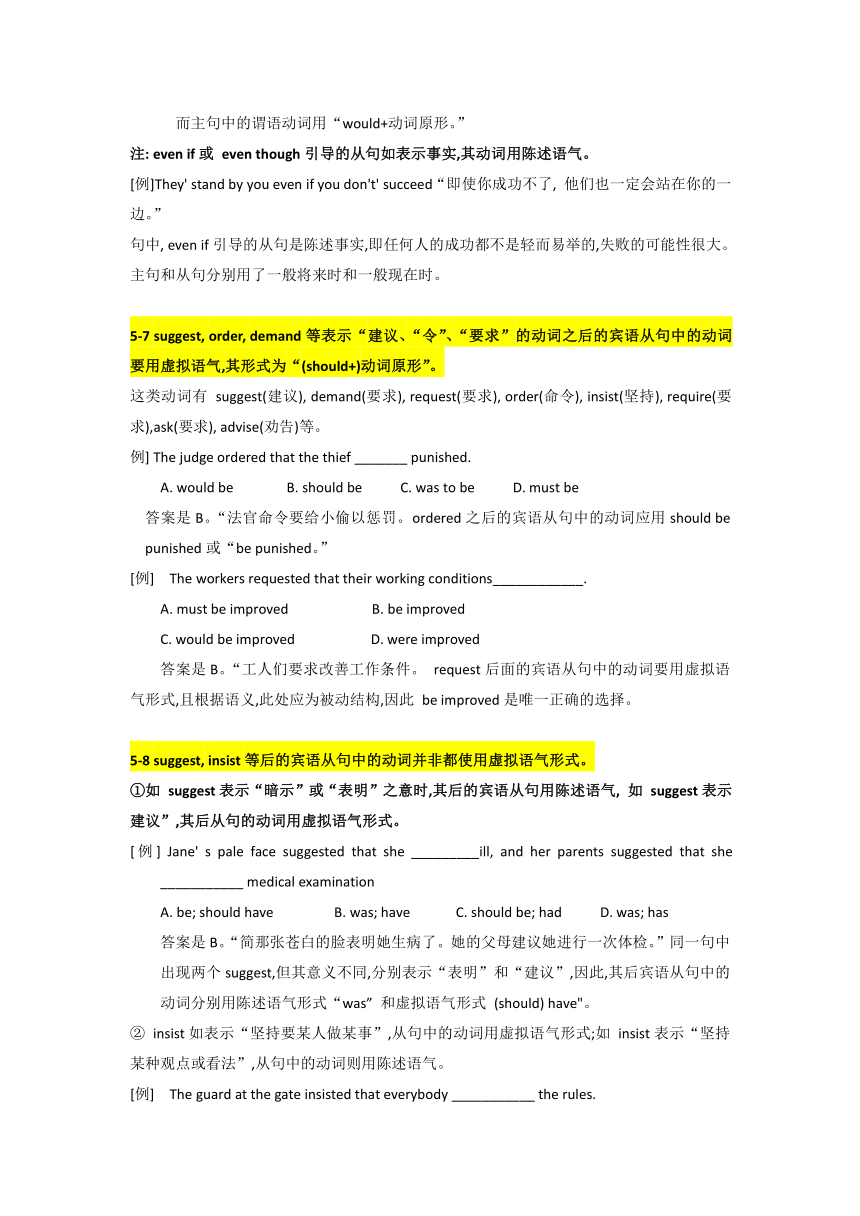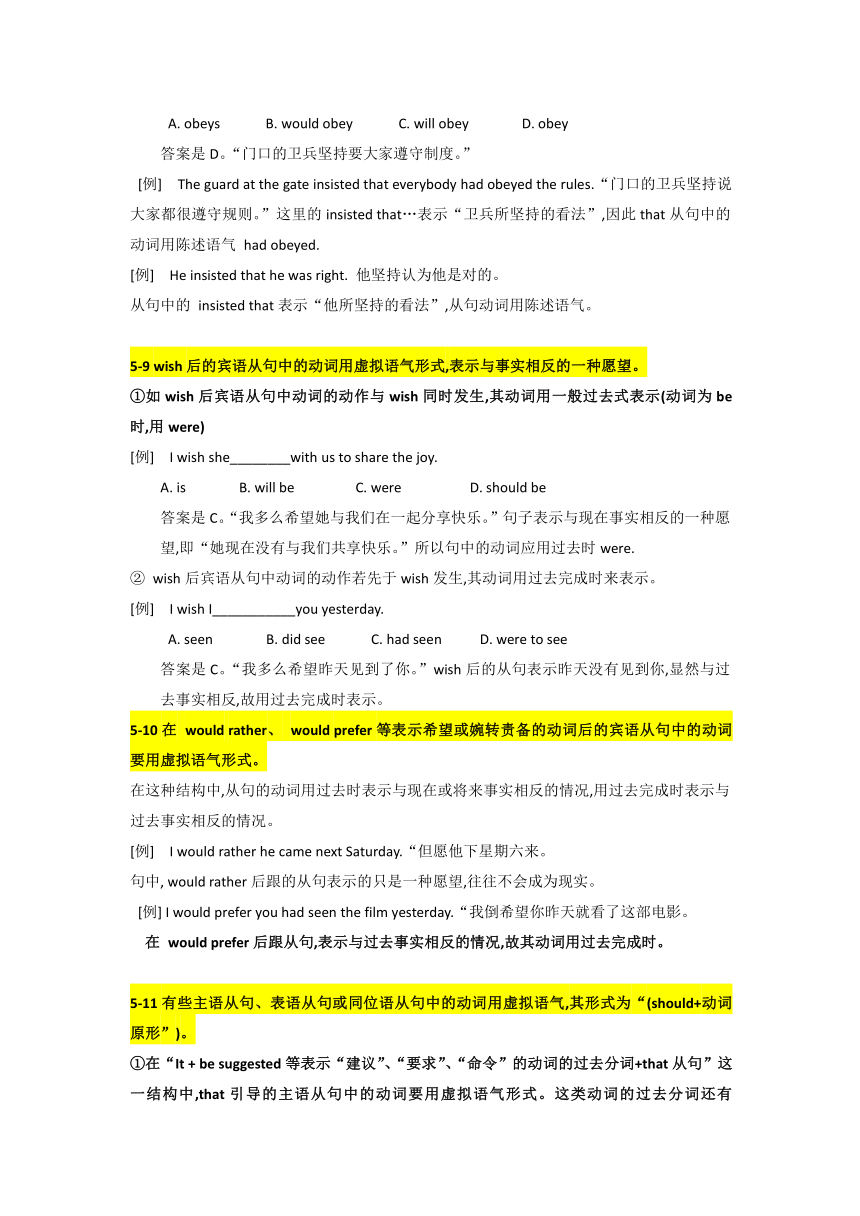动词的语气(英语语法第五章)讲义(含答案)-2025届高三英语二轮复习专项
文档属性
| 名称 | 动词的语气(英语语法第五章)讲义(含答案)-2025届高三英语二轮复习专项 |  | |
| 格式 | docx | ||
| 文件大小 | 1.1MB | ||
| 资源类型 | 教案 | ||
| 版本资源 | 人教版(2019) | ||
| 科目 | 英语 | ||
| 更新时间 | 2025-01-07 13:55:40 | ||
图片预览





文档简介
第5章动词的语气
5-1语气有三种:陈述语气,祈使语气和虚拟语气。
语气是动词的一种形式,它表示说话人对动词所表示的动作或所处的状态持有的态度或看法。
①陈述语气见于大多数句子中,用来陈述事实或就事实提出询句。广泛用于陈述句(包括肯定句、否定句)和疑问句中。
[例] She can't help to clean the house because she's busy making a cake.“她没法帮着打扫屋子,因为她正忙着做蛋糕。”
②祈使语气仅用于祈使句中,表示说话人向对方提出请求、劝告或命令。
[例] ------Please remember me to your Mum.
-------Thank you. I certainly will.“请代我向你妈妈问好。”“谢谢,我一定会的。”
③虚拟语气表示不可能实现的愿望、想象或与事实相反的假设。其谓语动词形式与陈述语气不同。
[例] If there were no subjunctive mood, English_________ much easier.
A. will be B. would have been C. could have been D. would be
答案是D。“假如没有虚拟语气,英语就容易多了。”本句表示一种与现在事实相反的假设,从句谓语动用were,主句中的谓语动词应用would be.
5-2虚拟语气用在非真实条件句中,主句和从句中的谓语动词形式较为固定。
在if引导的非真实条件句中,其假设分三种情况:与现在事实相反,与过去事实相反,与将来事实相反。
虚拟情况 If条件句 结果主句
与现在事实相反 If + 主语 + 动词过去式 (be 用were) 主语 + would (should, could, might) + 动词原形
与过去事实相反 If + 主语 + had + 过去分词 主语 + would (should, could, might) + have + 过去分词
与将来事实相反 If + 主语+ should/ were to + 动词原形 或If + 主语+动词的过去式 主语 + would (should, could, might) + 动词原形
[例] If I were a bird, I should fly in the sky. “假如我是一只鸟,我会在天空中飞翔。”
事实上,这是一个表示与现在事实相反的假设,即: 我不是鸟,我也不会在天空中飞翔。
[例If he _______, he________ that food. Luckily, he was sent to the hospital immediately.
A. was warned; would not take B. had been warned; would not have taken
C. would be warned; had not taken D. would have been warned; had not taken
答案是B。“假如有人警告他那食物不能吃,他就不会吃了。幸好他被立即送到了医院。”此句表示与过去事实相反的假设,条件从句中的动词应用“had+过去分词”形式,而且这里应用被动结构;主句中的动词须用 would + have + 过去分词”的形式。
5-3在if引导的非真实条件句中,if可以省略,但需用倒装结构。
如if从句中 were, had, should时,可将它们提到主语之前,并将if 省略,而且省略if的从句一般置于主句之前。
[例] Had he been worried, he would not have taken that food.(由5-2的例句变来)
[例] Should the earth stop turning, what would happen或 Were the earth to stop turning, what would happen (由5-2的例句变来)若将原题 would stop改为 stopped,则此句不可变为 Stopped the earth turning, what would happen
5-4虚拟语气可不用if从句表条件,而用介词 without, but for等或连词otherwise等表示一种含蓄条件。
[例] Without electricity human life ________ quite differently today.
A.is B. will be C. would have been D. would be
答案是D。“如果没有电,今天人类的生活会完全不一样。”句中, without引起的介词短语相当于if条件“ there were no electricity.”
[例] Jack can't have arrived yet; otherwise he would have telephoned me. “杰克还不可能到达,要不,他早就给我打电话了。”
在这里, otherwise隐含“if he had arrived这个表示与过去事实相反的假设, 而且前句“Jack can’t have arrived yet”已陈述了否定的事实。
[例] But for the storm, We__________earlier.
A. will arrive B. should have arrived C. arrive D. arrived
答案是B。“要不是由于这场暴风雨,我们一定到得更早。 But for 短语相当于“If it had not been for the storm,”表示与过去事实相反的假设。
5-5表示错综时间的虚拟语气指主句的动作和条件从句的动作不是发生在同一时间。
在表示错综时间的虚拟语气中,主句和条件从句中的动词要根据句意采用不同的时态。
[例] If I were you, I would have taken his advice.“我要是你,就听他的忠告了。”
句中,if从句表示与现在事实相反的假设,而主句表示与过去事实相反的结果。
[例] If he had listened to me, he would not be in such trouble now.“如果他当时听了我的话,现在就不会遇到麻烦了。”
这是个含有错综时间的虚拟语气的句子。if从句的动词表示过去的时间,主句的动词表示现在时间。
5-6目的状语从句、方式状语从句和让步状语从句中,有时要用虚拟语气
①在以 so that和 in order that引导的目的状语从句中,动词形式为“might, could, should, would + 动词原形。”
[例] Mark tried to tie the boat to the buoy so that it wouldn't' be hit by other ships.马克试图把船系到浮标上,以防被别的船撞上。”
②在as if或 as though引导的方式状语从句中, 如其含义与事实相反, 其动词用虚拟语气形式。若从句动作与主句动作同时发生, 动词用过去时(be 用were),若从句动作先于主句动作发生,则用“had+过去分词。
[例] When a pencil is partly in a glass of water, it looks as if it __________.
A. breaks B. has broken C. were broken D. had been broken
答案是C。 “当一支铅笔部分地插在一杯水中时,它看上去像是断的。”。as if引导的方式状语从句中的动词要用虚拟语气, 因为实际上铅笔在水中不可能是断的,只是看上去像是断的。而且从句动作与 looks同时发生,要用 were broken,不能用 had been broken,排除D。
[例] The two strangers talked as if they _________friends for years.
A. should be B. would be C. have been D. had been
答案是D。“那两位陌生人谈论着,好像他们是多年的老朋友似的。” 题干中 strangers一词,就表明了他们不会是多年的朋友。因此,从句要用虚拟语气。而且从句动作be应发生在主句动作 talked 之前,所以从句的动词用“had been”。
注:as if引导的方式状语从句若表示有明显迹象,的确要发生某事时,用陈述语气。
[例] The clouds are getting darker and darker. It looks as if it is going to rain.“云越来越黑了,看上去好象要下雨。”
从前半句所提供的情景,我们可以看出下雨是极有可能的,因此as if从句中的动词用陈述语气,即 is going to的形式。
③ even if或 even though引导的让步状语从句,若表示与事实相反, 其动词用虚拟语气形式。从句及主句中谓语动词形式与非真实条件句中的形式相同。(参见[5-2]的表格)
【例】 Even if/Even though I were rich, I would work即使我很富有, 我也要工作。”
句中, even if引导的从句只是表示一种与现在事实相反的假设,其谓语动词用“were”,而主句中的谓语动词用“would+动词原形。”
注: even if或 even though引导的从句如表示事实,其动词用陈述语气。
[例]They' stand by you even if you don't' succeed“即使你成功不了, 他们也一定会站在你的一边。”
句中, even if引导的从句是陈述事实,即任何人的成功都不是轻而易举的,失败的可能性很大。主句和从句分别用了一般将来时和一般现在时。
5-7 suggest, order, demand等表示“建议、“令”、“要求”的动词之后的宾语从句中的动词要用虚拟语气,其形式为“(should+)动词原形”。
这类动词有 suggest(建议), demand(要求), request(要求), order(命令), insist(坚持), require(要求),ask(要求), advise(劝告)等。
例] The judge ordered that the thief _______ punished.
A. would be B. should be C. was to be D. must be
答案是B。“法官命令要给小偷以惩罚。ordered之后的宾语从句中的动词应用should be punished或“be punished。”
[例] The workers requested that their working conditions____________.
A. must be improved B. be improved
C. would be improved D. were improved
答案是B。“工人们要求改善工作条件。 request后面的宾语从句中的动词要用虚拟语气形式,且根据语义,此处应为被动结构,因此 be improved是唯一正确的选择。
5-8 suggest, insist等后的宾语从句中的动词并非都使用虚拟语气形式。
①如 suggest表示“暗示”或“表明”之意时,其后的宾语从句用陈述语气, 如 suggest表示建议”,其后从句的动词用虚拟语气形式。
[例] Jane' s pale face suggested that she _________ill, and her parents suggested that she ___________ medical examination
A. be; should have B. was; have C. should be; had D. was; has
答案是B。“简那张苍白的脸表明她生病了。她的父母建议她进行一次体检。”同一句中出现两个suggest,但其意义不同,分别表示“表明”和“建议”,因此,其后宾语从句中的动词分别用陈述语气形式“was” 和虚拟语气形式 (should) have"。
② insist如表示“坚持要某人做某事”,从句中的动词用虚拟语气形式;如 insist表示“坚持某种观点或看法”,从句中的动词则用陈述语气。
[例] The guard at the gate insisted that everybody ___________ the rules.
A. obeys B. would obey C. will obey D. obey
答案是D。“门口的卫兵坚持要大家遵守制度。”
[例] The guard at the gate insisted that everybody had obeyed the rules.“门口的卫兵坚持说大家都很遵守规则。”这里的insisted that…表示“卫兵所坚持的看法”,因此that从句中的动词用陈述语气 had obeyed.
[例] He insisted that he was right. 他坚持认为他是对的。
从句中的 insisted that表示“他所坚持的看法”,从句动词用陈述语气。
5-9 wish后的宾语从句中的动词用虚拟语气形式,表示与事实相反的一种愿望。
①如wish后宾语从句中动词的动作与wish同时发生,其动词用一般过去式表示(动词为be时,用were)
[例] I wish she________with us to share the joy.
A. is B. will be C. were D. should be
答案是C。“我多么希望她与我们在一起分享快乐。”句子表示与现在事实相反的一种愿望,即“她现在没有与我们共享快乐。”所以句中的动词应用过去时were.
② wish后宾语从句中动词的动作若先于wish发生,其动词用过去完成时来表示。
[例] I wish I___________you yesterday.
A. seen B. did see C. had seen D. were to see
答案是C。“我多么希望昨天见到了你。”wish后的从句表示昨天没有见到你,显然与过去事实相反,故用过去完成时表示。
5-10在 would rather、 would prefer等表示希望或婉转责备的动词后的宾语从句中的动词要用虚拟语气形式。
在这种结构中,从句的动词用过去时表示与现在或将来事实相反的情况,用过去完成时表示与过去事实相反的情况。
[例] I would rather he came next Saturday.“但愿他下星期六来。
句中, would rather后跟的从句表示的只是一种愿望,往往不会成为现实。
[例] I would prefer you had seen the film yesterday.“我倒希望你昨天就看了这部电影。
在 would prefer后跟从句,表示与过去事实相反的情况,故其动词用过去完成时。
5-11有些主语从句、表语从句或同位语从句中的动词用虚拟语气,其形式为“(should+动词原形”)。
①在“It + be suggested等表示“建议”、“要求”、“命令”的动词的过去分词+that从句”这一结构中,that引导的主语从句中的动词要用虚拟语气形式。这类动词的过去分词还有ordered, demanded, required等。[参见5-7所列动词]。
[例] It was requested that their working conditions be improved.“有人要求改善他们的工作环境”。
[例] It was suggested that Jane (should) have a medical examination. “有人建议说简应该进行一次体格检查。”
②在“It + be + important等表示“重要”、“必要”的形容词+that从句”这一结构中,that引导的主语从句用虚拟语气。这类形容词有 important, desirable(理想的), better, strange, necessary, surprising等
[例] It is necessary that you ________present at the discussion.
A. will be B. are C. should be D. were
答案是C。“你出席这次讨论会很有必要。在这里,也可省略should 直接用be。
③表示“要求”,“建议”,“命令”等意义的名词作主语,表语从句中的动词要用虚拟语气;当这类名词用作同位语从句的先行词时,从句中的动词也用虚拟语气,即“( should+)动词原形。”这类名词有: suggestion, demand, request, order, insistence, requirement, advice, idea等。
[例] The workers’ requirement was that their working conditions be improved.“工人们的要求是他们的工作条件应得到改善。”
例] The suggestion that Jane have a medical examination was put forward by her parents.“简应该进行一次体格检查的建议是她父母提出的。”
5-12在“It is (high/about) time + (that)从句”的句型中, that从句中的动词要用虚拟语气。
在这个句型中,that常常省略。从句中的动词用过去时,有时用“should+动词原形。”其含义为“该是干某事的时候了。”
[例] It 's' time we left我们该走了”。
比用It' 's time for us to leave的语气显得委婉一些。
5-13某些表示祝愿或愿望的句子要用虚拟语气。
①祝愿句常用原形动词或may引导的倒装句
[例] Long live China!“中国万岁”!
[例] God bless you!“愿上帝祝福你”
或说成: May God bless you!
②表示现在或过去不能实现的一种愿望, if only后用动词过去时或过去完成时。
[例] If only he had seen me!“他要是能见到我该有多好啊”!
If only后用过去完成时表示过去不能实现的愿望。
[例] If only that photo weren't' missing! 要是那张照片不丢该有多好啊!
If only后用一般过去时表示现在不能实现的愿望。
5-14有些该用陈述语气的句子易被误用虚拟语气,应引起注意。
----We could have walked to the station, it was so near.
-----Yes. A taxi _________ at all necessary.
A. wasn't B. hadn't been C. wouldn't be D. won't be
答案是A。“我们应该步行到车站,路很近。”“是的,坐出租车根本没有必要。”第一句中,动词 could have walked表示了虚拟语气,说明他们没有步行去车站,但在答句中,应使用陈述语气,因为“路很近,出租车没有必要”是事实,而并非假设。
第5章“动词的语气”专项能力训练题
单项填空:
1. Don't smoke in the meeting room,_____________
A. do you B. will you C. can you D. could you
2 _______down the radio. The baby's' asleep in the next room.
A. Turning B. Turn C. Turned D. To turn
3. If no one ________phone at home, ring me at work
A. returns B. replies C. answers D. receives
4. I didn't see your sister at the meeting. If she __________, she would have met my brother
A. has come B. did come C. came D. had come
5. I ________Professor Jones had taught me this question.
A. believe B. deeply think. C. wish D. suppose
6. The sun rises in the east and sets in the west, so it seems as if the sun _________round the earth
A. circles B. is circling C. be circling D. were circling
7. The chairman requested that _________
A. the members studied the problem more carefully
B. the problem were more carefully studied
C. the problem could be studied with more care
D. the members study the problem more carefully
8. -------That' s beautiful coat in the window.
--------It certainly is. If I had the money, ________buy it.
A. I'd B. I'll C. I may D. I shall
9. Jill would rather we _______now, but we must go to work.
A. not leave B. had not left C. didn't leave D. not to be left
10. The idea is that we ___________there.
A. will walk B. could walk C. walk D. be walked
11. -------“Where have you been ”
---------"I was caught in the traffic, ________I would have been here sooner.
A. however B. although C. anyway D. otherwise
12. ----------“Why didn't' you help him ”
--------“I would have______I didn't have the money.”
A. if B. and C. but D. otherwise
13. If only I _______how to operate a computer as you do!
A. had know B. would know C. should know D. knew
14. The picture exhibition bored me to death. I wish I_______to it.
A. hadn't gone B. haven't gone C. didn't go D. could not have gone
15. It is desirable that the plane _________as light as possible.
A. was. B. be C. is D. were
16. He talked as if he ____________for years.
A. is living there B. was living there
C. has lived there D. had lived there
5-1语气有三种:陈述语气,祈使语气和虚拟语气。
语气是动词的一种形式,它表示说话人对动词所表示的动作或所处的状态持有的态度或看法。
①陈述语气见于大多数句子中,用来陈述事实或就事实提出询句。广泛用于陈述句(包括肯定句、否定句)和疑问句中。
[例] She can't help to clean the house because she's busy making a cake.“她没法帮着打扫屋子,因为她正忙着做蛋糕。”
②祈使语气仅用于祈使句中,表示说话人向对方提出请求、劝告或命令。
[例] ------Please remember me to your Mum.
-------Thank you. I certainly will.“请代我向你妈妈问好。”“谢谢,我一定会的。”
③虚拟语气表示不可能实现的愿望、想象或与事实相反的假设。其谓语动词形式与陈述语气不同。
[例] If there were no subjunctive mood, English_________ much easier.
A. will be B. would have been C. could have been D. would be
答案是D。“假如没有虚拟语气,英语就容易多了。”本句表示一种与现在事实相反的假设,从句谓语动用were,主句中的谓语动词应用would be.
5-2虚拟语气用在非真实条件句中,主句和从句中的谓语动词形式较为固定。
在if引导的非真实条件句中,其假设分三种情况:与现在事实相反,与过去事实相反,与将来事实相反。
虚拟情况 If条件句 结果主句
与现在事实相反 If + 主语 + 动词过去式 (be 用were) 主语 + would (should, could, might) + 动词原形
与过去事实相反 If + 主语 + had + 过去分词 主语 + would (should, could, might) + have + 过去分词
与将来事实相反 If + 主语+ should/ were to + 动词原形 或If + 主语+动词的过去式 主语 + would (should, could, might) + 动词原形
[例] If I were a bird, I should fly in the sky. “假如我是一只鸟,我会在天空中飞翔。”
事实上,这是一个表示与现在事实相反的假设,即: 我不是鸟,我也不会在天空中飞翔。
[例If he _______, he________ that food. Luckily, he was sent to the hospital immediately.
A. was warned; would not take B. had been warned; would not have taken
C. would be warned; had not taken D. would have been warned; had not taken
答案是B。“假如有人警告他那食物不能吃,他就不会吃了。幸好他被立即送到了医院。”此句表示与过去事实相反的假设,条件从句中的动词应用“had+过去分词”形式,而且这里应用被动结构;主句中的动词须用 would + have + 过去分词”的形式。
5-3在if引导的非真实条件句中,if可以省略,但需用倒装结构。
如if从句中 were, had, should时,可将它们提到主语之前,并将if 省略,而且省略if的从句一般置于主句之前。
[例] Had he been worried, he would not have taken that food.(由5-2的例句变来)
[例] Should the earth stop turning, what would happen或 Were the earth to stop turning, what would happen (由5-2的例句变来)若将原题 would stop改为 stopped,则此句不可变为 Stopped the earth turning, what would happen
5-4虚拟语气可不用if从句表条件,而用介词 without, but for等或连词otherwise等表示一种含蓄条件。
[例] Without electricity human life ________ quite differently today.
A.is B. will be C. would have been D. would be
答案是D。“如果没有电,今天人类的生活会完全不一样。”句中, without引起的介词短语相当于if条件“ there were no electricity.”
[例] Jack can't have arrived yet; otherwise he would have telephoned me. “杰克还不可能到达,要不,他早就给我打电话了。”
在这里, otherwise隐含“if he had arrived这个表示与过去事实相反的假设, 而且前句“Jack can’t have arrived yet”已陈述了否定的事实。
[例] But for the storm, We__________earlier.
A. will arrive B. should have arrived C. arrive D. arrived
答案是B。“要不是由于这场暴风雨,我们一定到得更早。 But for 短语相当于“If it had not been for the storm,”表示与过去事实相反的假设。
5-5表示错综时间的虚拟语气指主句的动作和条件从句的动作不是发生在同一时间。
在表示错综时间的虚拟语气中,主句和条件从句中的动词要根据句意采用不同的时态。
[例] If I were you, I would have taken his advice.“我要是你,就听他的忠告了。”
句中,if从句表示与现在事实相反的假设,而主句表示与过去事实相反的结果。
[例] If he had listened to me, he would not be in such trouble now.“如果他当时听了我的话,现在就不会遇到麻烦了。”
这是个含有错综时间的虚拟语气的句子。if从句的动词表示过去的时间,主句的动词表示现在时间。
5-6目的状语从句、方式状语从句和让步状语从句中,有时要用虚拟语气
①在以 so that和 in order that引导的目的状语从句中,动词形式为“might, could, should, would + 动词原形。”
[例] Mark tried to tie the boat to the buoy so that it wouldn't' be hit by other ships.马克试图把船系到浮标上,以防被别的船撞上。”
②在as if或 as though引导的方式状语从句中, 如其含义与事实相反, 其动词用虚拟语气形式。若从句动作与主句动作同时发生, 动词用过去时(be 用were),若从句动作先于主句动作发生,则用“had+过去分词。
[例] When a pencil is partly in a glass of water, it looks as if it __________.
A. breaks B. has broken C. were broken D. had been broken
答案是C。 “当一支铅笔部分地插在一杯水中时,它看上去像是断的。”。as if引导的方式状语从句中的动词要用虚拟语气, 因为实际上铅笔在水中不可能是断的,只是看上去像是断的。而且从句动作与 looks同时发生,要用 were broken,不能用 had been broken,排除D。
[例] The two strangers talked as if they _________friends for years.
A. should be B. would be C. have been D. had been
答案是D。“那两位陌生人谈论着,好像他们是多年的老朋友似的。” 题干中 strangers一词,就表明了他们不会是多年的朋友。因此,从句要用虚拟语气。而且从句动作be应发生在主句动作 talked 之前,所以从句的动词用“had been”。
注:as if引导的方式状语从句若表示有明显迹象,的确要发生某事时,用陈述语气。
[例] The clouds are getting darker and darker. It looks as if it is going to rain.“云越来越黑了,看上去好象要下雨。”
从前半句所提供的情景,我们可以看出下雨是极有可能的,因此as if从句中的动词用陈述语气,即 is going to的形式。
③ even if或 even though引导的让步状语从句,若表示与事实相反, 其动词用虚拟语气形式。从句及主句中谓语动词形式与非真实条件句中的形式相同。(参见[5-2]的表格)
【例】 Even if/Even though I were rich, I would work即使我很富有, 我也要工作。”
句中, even if引导的从句只是表示一种与现在事实相反的假设,其谓语动词用“were”,而主句中的谓语动词用“would+动词原形。”
注: even if或 even though引导的从句如表示事实,其动词用陈述语气。
[例]They' stand by you even if you don't' succeed“即使你成功不了, 他们也一定会站在你的一边。”
句中, even if引导的从句是陈述事实,即任何人的成功都不是轻而易举的,失败的可能性很大。主句和从句分别用了一般将来时和一般现在时。
5-7 suggest, order, demand等表示“建议、“令”、“要求”的动词之后的宾语从句中的动词要用虚拟语气,其形式为“(should+)动词原形”。
这类动词有 suggest(建议), demand(要求), request(要求), order(命令), insist(坚持), require(要求),ask(要求), advise(劝告)等。
例] The judge ordered that the thief _______ punished.
A. would be B. should be C. was to be D. must be
答案是B。“法官命令要给小偷以惩罚。ordered之后的宾语从句中的动词应用should be punished或“be punished。”
[例] The workers requested that their working conditions____________.
A. must be improved B. be improved
C. would be improved D. were improved
答案是B。“工人们要求改善工作条件。 request后面的宾语从句中的动词要用虚拟语气形式,且根据语义,此处应为被动结构,因此 be improved是唯一正确的选择。
5-8 suggest, insist等后的宾语从句中的动词并非都使用虚拟语气形式。
①如 suggest表示“暗示”或“表明”之意时,其后的宾语从句用陈述语气, 如 suggest表示建议”,其后从句的动词用虚拟语气形式。
[例] Jane' s pale face suggested that she _________ill, and her parents suggested that she ___________ medical examination
A. be; should have B. was; have C. should be; had D. was; has
答案是B。“简那张苍白的脸表明她生病了。她的父母建议她进行一次体检。”同一句中出现两个suggest,但其意义不同,分别表示“表明”和“建议”,因此,其后宾语从句中的动词分别用陈述语气形式“was” 和虚拟语气形式 (should) have"。
② insist如表示“坚持要某人做某事”,从句中的动词用虚拟语气形式;如 insist表示“坚持某种观点或看法”,从句中的动词则用陈述语气。
[例] The guard at the gate insisted that everybody ___________ the rules.
A. obeys B. would obey C. will obey D. obey
答案是D。“门口的卫兵坚持要大家遵守制度。”
[例] The guard at the gate insisted that everybody had obeyed the rules.“门口的卫兵坚持说大家都很遵守规则。”这里的insisted that…表示“卫兵所坚持的看法”,因此that从句中的动词用陈述语气 had obeyed.
[例] He insisted that he was right. 他坚持认为他是对的。
从句中的 insisted that表示“他所坚持的看法”,从句动词用陈述语气。
5-9 wish后的宾语从句中的动词用虚拟语气形式,表示与事实相反的一种愿望。
①如wish后宾语从句中动词的动作与wish同时发生,其动词用一般过去式表示(动词为be时,用were)
[例] I wish she________with us to share the joy.
A. is B. will be C. were D. should be
答案是C。“我多么希望她与我们在一起分享快乐。”句子表示与现在事实相反的一种愿望,即“她现在没有与我们共享快乐。”所以句中的动词应用过去时were.
② wish后宾语从句中动词的动作若先于wish发生,其动词用过去完成时来表示。
[例] I wish I___________you yesterday.
A. seen B. did see C. had seen D. were to see
答案是C。“我多么希望昨天见到了你。”wish后的从句表示昨天没有见到你,显然与过去事实相反,故用过去完成时表示。
5-10在 would rather、 would prefer等表示希望或婉转责备的动词后的宾语从句中的动词要用虚拟语气形式。
在这种结构中,从句的动词用过去时表示与现在或将来事实相反的情况,用过去完成时表示与过去事实相反的情况。
[例] I would rather he came next Saturday.“但愿他下星期六来。
句中, would rather后跟的从句表示的只是一种愿望,往往不会成为现实。
[例] I would prefer you had seen the film yesterday.“我倒希望你昨天就看了这部电影。
在 would prefer后跟从句,表示与过去事实相反的情况,故其动词用过去完成时。
5-11有些主语从句、表语从句或同位语从句中的动词用虚拟语气,其形式为“(should+动词原形”)。
①在“It + be suggested等表示“建议”、“要求”、“命令”的动词的过去分词+that从句”这一结构中,that引导的主语从句中的动词要用虚拟语气形式。这类动词的过去分词还有ordered, demanded, required等。[参见5-7所列动词]。
[例] It was requested that their working conditions be improved.“有人要求改善他们的工作环境”。
[例] It was suggested that Jane (should) have a medical examination. “有人建议说简应该进行一次体格检查。”
②在“It + be + important等表示“重要”、“必要”的形容词+that从句”这一结构中,that引导的主语从句用虚拟语气。这类形容词有 important, desirable(理想的), better, strange, necessary, surprising等
[例] It is necessary that you ________present at the discussion.
A. will be B. are C. should be D. were
答案是C。“你出席这次讨论会很有必要。在这里,也可省略should 直接用be。
③表示“要求”,“建议”,“命令”等意义的名词作主语,表语从句中的动词要用虚拟语气;当这类名词用作同位语从句的先行词时,从句中的动词也用虚拟语气,即“( should+)动词原形。”这类名词有: suggestion, demand, request, order, insistence, requirement, advice, idea等。
[例] The workers’ requirement was that their working conditions be improved.“工人们的要求是他们的工作条件应得到改善。”
例] The suggestion that Jane have a medical examination was put forward by her parents.“简应该进行一次体格检查的建议是她父母提出的。”
5-12在“It is (high/about) time + (that)从句”的句型中, that从句中的动词要用虚拟语气。
在这个句型中,that常常省略。从句中的动词用过去时,有时用“should+动词原形。”其含义为“该是干某事的时候了。”
[例] It 's' time we left我们该走了”。
比用It' 's time for us to leave的语气显得委婉一些。
5-13某些表示祝愿或愿望的句子要用虚拟语气。
①祝愿句常用原形动词或may引导的倒装句
[例] Long live China!“中国万岁”!
[例] God bless you!“愿上帝祝福你”
或说成: May God bless you!
②表示现在或过去不能实现的一种愿望, if only后用动词过去时或过去完成时。
[例] If only he had seen me!“他要是能见到我该有多好啊”!
If only后用过去完成时表示过去不能实现的愿望。
[例] If only that photo weren't' missing! 要是那张照片不丢该有多好啊!
If only后用一般过去时表示现在不能实现的愿望。
5-14有些该用陈述语气的句子易被误用虚拟语气,应引起注意。
----We could have walked to the station, it was so near.
-----Yes. A taxi _________ at all necessary.
A. wasn't B. hadn't been C. wouldn't be D. won't be
答案是A。“我们应该步行到车站,路很近。”“是的,坐出租车根本没有必要。”第一句中,动词 could have walked表示了虚拟语气,说明他们没有步行去车站,但在答句中,应使用陈述语气,因为“路很近,出租车没有必要”是事实,而并非假设。
第5章“动词的语气”专项能力训练题
单项填空:
1. Don't smoke in the meeting room,_____________
A. do you B. will you C. can you D. could you
2 _______down the radio. The baby's' asleep in the next room.
A. Turning B. Turn C. Turned D. To turn
3. If no one ________phone at home, ring me at work
A. returns B. replies C. answers D. receives
4. I didn't see your sister at the meeting. If she __________, she would have met my brother
A. has come B. did come C. came D. had come
5. I ________Professor Jones had taught me this question.
A. believe B. deeply think. C. wish D. suppose
6. The sun rises in the east and sets in the west, so it seems as if the sun _________round the earth
A. circles B. is circling C. be circling D. were circling
7. The chairman requested that _________
A. the members studied the problem more carefully
B. the problem were more carefully studied
C. the problem could be studied with more care
D. the members study the problem more carefully
8. -------That' s beautiful coat in the window.
--------It certainly is. If I had the money, ________buy it.
A. I'd B. I'll C. I may D. I shall
9. Jill would rather we _______now, but we must go to work.
A. not leave B. had not left C. didn't leave D. not to be left
10. The idea is that we ___________there.
A. will walk B. could walk C. walk D. be walked
11. -------“Where have you been ”
---------"I was caught in the traffic, ________I would have been here sooner.
A. however B. although C. anyway D. otherwise
12. ----------“Why didn't' you help him ”
--------“I would have______I didn't have the money.”
A. if B. and C. but D. otherwise
13. If only I _______how to operate a computer as you do!
A. had know B. would know C. should know D. knew
14. The picture exhibition bored me to death. I wish I_______to it.
A. hadn't gone B. haven't gone C. didn't go D. could not have gone
15. It is desirable that the plane _________as light as possible.
A. was. B. be C. is D. were
16. He talked as if he ____________for years.
A. is living there B. was living there
C. has lived there D. had lived there
